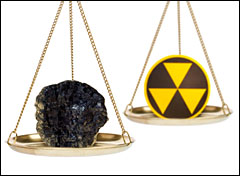Dear Umbra,
I work for a certain large environmental organization, and I have often had to deal with the issue of nuclear and coal-fired power plants. If ever asked which is better, we are officially supposed to say “neither.” But I think a response like that doesn’t always work for the real world, so I’d like to ask you, oh answerer of environmental questions, which type of power plant do you think is best (or, least worst) for the environment, nuclear or coal? And your answer can’t be neither!
MF
San Francisco, Calif.
Dearest MF,
You are evil. I publish this question only because I share your dilemma, and feel I may be able to offer you new ways to squirm out of answering the question. Of course, I have a better situation than you: when someone asks me which is better, nuclear or coal, I can always just ignore the letter. For you, I will face the problem and wiggle out of it in public. I hope you feel the love.

Eeny, meeny, miny … no.
One thing I will say at the outset is that this (theoretical) comparison is a very complex one, and best left to professionals whose job is to make these types of evaluations, not professionals whose job is to write about them.
Cursorily, nuclear power is a potential Xtreme disaster waiting to happen both in terms of operation and of “homeland security,” cannot save us from our immediate crisis, and is a completely unresolved toxic-waste issue that we are handing down to the next hundred generations. Coal is and will increasingly be a major contributor to air pollution and climate change, not to mention what its extraction does to the ground and nearby residents. Neither industry has sufficient government oversight, and both have too much government support. Right now nuclear gets some low-greenhouse-gas positive traction; maybe back in the ’80s when nukes were non grata, coal looked all bright and shiny. But neither is good, neither is better. Neither, despite your protestation, is the only answer I can give.
The way we need to wiggle out of answering this question is to recognize it as a false dichotomy. This is almost never a choice the average person actually can make, and engaging in this dichotomy lends legitimacy to a false scenario in which we as a region, country, or world are forced to chose coal or nukes and have no access to developing other energy sources. It is a worst-case, stuck-in-the-corner, fake match-up.
On a daily level, most of us have little choice as to which power source we support with our monthly electricity or heating bill. If we do have choices, we should first buy renewable energy or even hydroelectric power (No. 1 way to wiggle out of plain old Neither). Find out if you have alternative choices by searching the EERE’s Green Power map. Agitate for the development of sustainable power sources and support conservation measures. This is a longer way to say “neither,” but I believe it to be a valid answer on an individual level.
If, where you live, you actually must choose between signing up for mostly nuclear and mostly coal power, make your decision on a local basis. Learn what you can about the nuclear plant and what you can about the coal. I, for instance, learned about how my electricity connects to mountaintop removal via the Sierra Club’s anti-coal site. If your community is faced with a decision about development of a new energy facility, which is initially posed as coal vs. nuclear, that is a decision to be made on a community basis, with thorough consideration of renewable alternatives. Hopefully the community would come around and choose “neither,” which again would be a valid choice.
On a larger scale, and in the theoretical discussions we have as voters and agitators, it is still legitimate to choose neither and in that way choose hope for the world. These are not the only two choices before us.
I enjoy reading the Union of Concerned Scientists’ position papers on the nuclear issue, as well as their description of coal power. I also very much enjoyed revisiting a column I wrote about considering nuclear power and noticing 45 comments below it — not only giving the cat article a run for its money, but providing a meaty discussion of our dilemmas.
Wiggly,
Umbra


